By Joel Tolman, Director of Impact & Engagement
What should every Common Ground 10th grader experience next year?
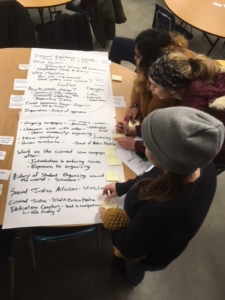
Catherine John — parent of a CG alumni and activist with Unidad Latina en Accion — shares work on a unit she helped create with CG Senior Hope Dymond and Farm Director Deborah Greig.
Maybe they could struggle with the question, “for whom is New Haven really a haven?” — connecting with organizations from Unidad Latina En Accion, to IRIS, to Data Haven, to learn about and contribute to work that makes our city live into its identity as a “sanctuary city” and an “urban refuge?
Maybe this deep dive into who calls New Haven home could flow into an exploration of social and environmental justice, where students explore the school to prison pipeline, the concentration of pollution in low-income communities of color, policies that exclude — and the legacy of those who have resisted these injustices?
Perhaps students should dive into a unit on POWER, examined from a variety of perspectives: from political power, to energy production and its consequences, to alternative energy, to Common Ground’s own POWER leadership framework?
Perhaps they could head out into our city’s neighborhoods — monitoring air, soil, and water quality, while also learning about those neighborhoods’ assets — and develop plans for addressing the environmental health and justice issues that emerge?
Should they learn about the systems that make our city run? Explore careers that might be of interest to them? Trace watersheds from source to sound, and share what they learn with elementary school students? Bring these questions to life in the form of a play?
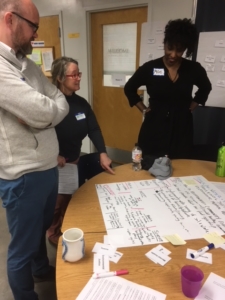
West Rock neighbor Kathy Fay, Common Ground English teacher Monique Frasier, and Dennis Wilson from IRIS review a draft unit focused on environmental justice and public health.
These are among the proposals that emerged from a community design workshop earlier this month in Common Ground’s cafeteria. The room was full of an amazing collection of community partners — from Elm Shakespeare, to Unidad Latina En Accion, to the Regional Water Authority, to Integrated Refugee & Immigrant Services, to the City Engineer’s Office, to the Community Foundation, to Yale’s Forestry School. These community partners were joined by a handful of Common Ground students, alumni, and parents, by teachers and neighbors from across the community, by our farmers, and by the teachers who will create and facilitate this experience.
As they dug into dinner prepared by Chef Fathiya and the rest of Common Ground’s kitchen staff, this incredible team talked about what they want most for our 10th grade students. They formed smaller design teams, organizing around themes that had emerged from conversations among Common Ground teachers and students. And they dove into the design process, charting out the big questions, topics field work opportunities, projects and products, and community partners that could make up engaging, authentic units of study.
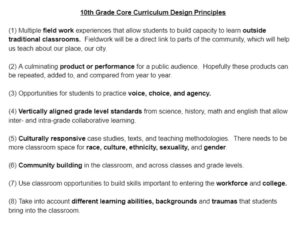
Students and teachers collaborated to create a set of design principles for the 10th grade curriculum. Click here to see the principles.
This community conversation is neither the first nor the last step in the process of improving and integrating our 10th graders’ experiences. This work on the 10th grade curriculum builds on the foundation of Common Ground’s new 9th grade core — four integrated units of study, each one pulling together English, Math, Science, and Social Studies around a common theme (like “feeding ourselves” or “identity and diversity”). While the 9th grade core focuses close to home — on our students’ own identities, and on our unique 20-acre site — the 10th grade aims to make the whole city of New Haven its classroom. This fall, four student interns worked with Jeremy Stone, one of the leaders of this curriculum development process, to develop a set of design principles for the new 10th grade curriculum, and to identify potential themes for four quarter-long units of study. Our entire faculty contributed their ideas for unit themes, as well. All this work has benefited from an ongoing partnership with four other urban, environmentally themed public high schools, taking on similar work in their own schools.
This week and next, our design team is turning the ideas from the community conversation into the themes of the four units that will organize our 10th grade curriculum. We will share these themes for feedback and input with this year’s 9th graders, recognizing that they are the primary stakeholders in what happens next year. And then, each month between now and the end of the school year, our design team will develop plans for one of these integrated units of study. We are excited to keep you updated on this process!
Do you want to get involved?
Right now, we’d invite you to leave your comments below: What do you think of “Whose Haven,” “Justice Systems,” “Power,” and “Environmental Justice & Public Health” as the organizing unit themes for our 10th graders’ experiences? What would you want to make sure every 10th grader experiences and learns through these units?
This spring, we’ll be developing ongoing partnerships with community organizations that — and we will be looking for feedback from students, families, and neighbors on our draft plans. Do you want to be part of this design and review process? Email me at jtolman@commongroundct.org, and I will add you to the invitation list for future community conversations.


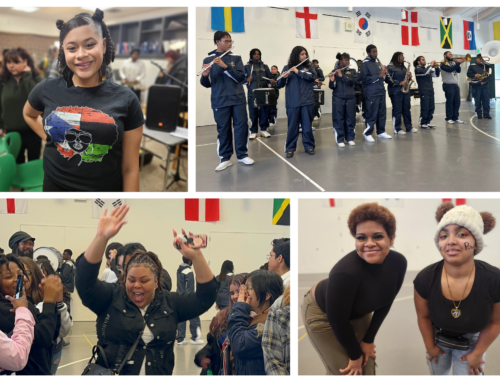
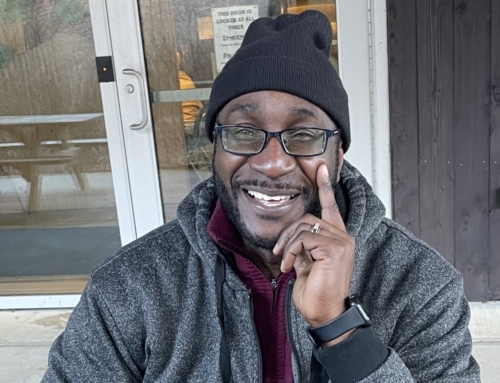
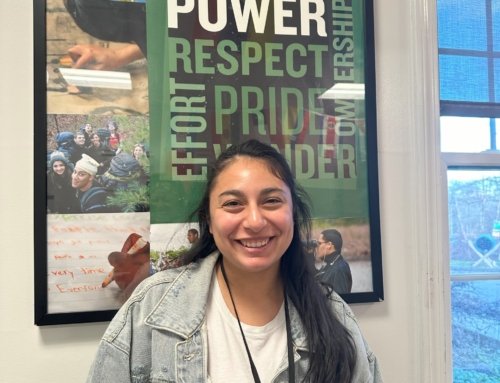
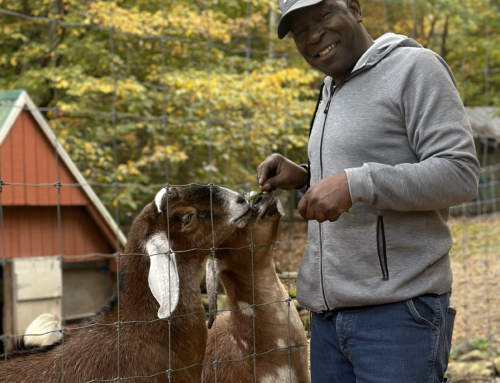
Leave A Comment